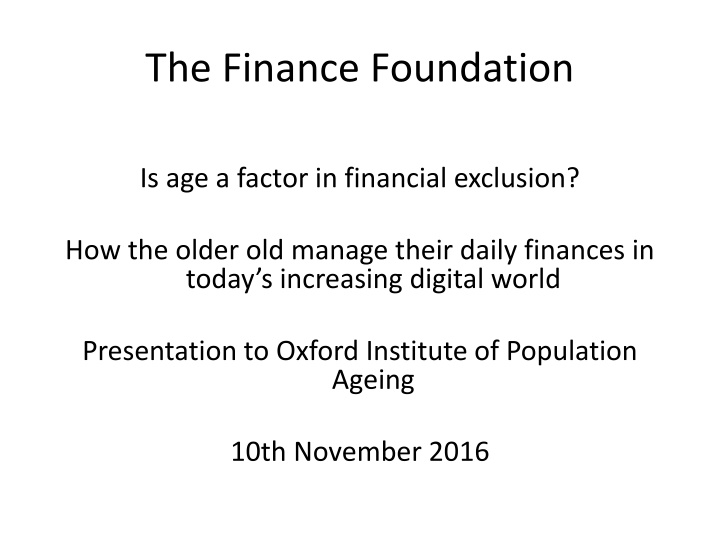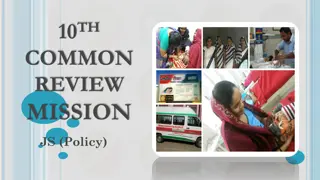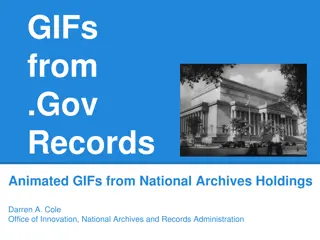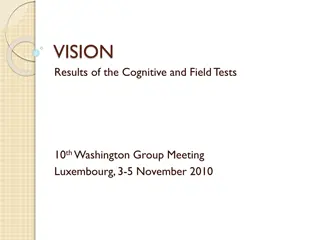
Financial Exclusion Among the Older Old: Managing Daily Finances in a Digital World
The Finance Foundation presented a study on how age affects financial exclusion, particularly among the older old (aged 80+), and how they navigate daily financial tasks in today's digital era. The research sheds light on challenges faced by this demographic, offers insights into their financial management strategies, and provides recommendations to address issues of financial access and inclusion.
Download Presentation

Please find below an Image/Link to download the presentation.
The content on the website is provided AS IS for your information and personal use only. It may not be sold, licensed, or shared on other websites without obtaining consent from the author. If you encounter any issues during the download, it is possible that the publisher has removed the file from their server.
You are allowed to download the files provided on this website for personal or commercial use, subject to the condition that they are used lawfully. All files are the property of their respective owners.
The content on the website is provided AS IS for your information and personal use only. It may not be sold, licensed, or shared on other websites without obtaining consent from the author.
E N D
Presentation Transcript
The Finance Foundation Is age a factor in financial exclusion? How the older old manage their daily finances in today s increasing digital world Presentation to Oxford Institute of Population Ageing 10th November 2016
The Finance Foundation An independent think tank that aims to encourage informed debate about financial services, explain what the sector does, and suggest ways it could work more effectively. We do this by undertaking research and publicising the results to inform and influence the relevant stakeholders; and by hosting public debates and events to help bring issues about the future of financial services into the open. Originally established as Demos Finance, the current not for profit company was formed in 2014. It is not a lobby group and has no political affiliation. www.thefinancefoundation.org.uk
Key People Andrew Freeman - Director - former Director of Demos Finance, was also the Managing Director of Cambridge Research Associates, which provided research and thought leadership for professional services firms, and is the founder of the website Fairer Finance. He was previously Executive Director at the Centre for Financial Services at Deloitte and a founder member of McKinsey & Company s risk practice. A Risk Fellow at the Cambridge Judge Business School, Andrew is a former banking editor of the Economist and a regular media commentator. In 2013, he wrote the report 'Finance for Growth', for Demos and in 2014 launched the first Finance Foundation report, 'Heroes or Zeros'. Hilary Cooper - Senior Associate - after completing a masters in economics, followed by a short period as a banking intern, Hilary worked for more than 20 years as a government economist and senior policy maker across a wide range of government departments, and served as an adviser and trustee of the youth charity Theatre Is... from 2008-12. Author of the Bluffer's Guide to Economics, and occasional feature writer, she has pursued a freelance career since leaving the civil service in 2011. During this time she also set up an on-line business to support mature carers, and in early 2014 published 'Putting Customers First' a report on retail finance regulation for Demos Finance, where she was a senior associate researcher.
New Research September 2016 When I m 84. Locking the Door on the Older Old: the Challenge Facing Britain s Banks. Hilary Cooper
Structure of talk Why we chose to focus our research on people in their 80s and 90s Discussion of financial exclusion and the way it may impact in older age Overview of the findings from our empirical work Consideration of the wider context affecting older people and their access to financial services Concluding remarks/recommendations
Researching the Older Old (80+) The older old those aged 80 and over are the fastest growing section of the population. Currently just over 3 million, this will increase to 3.5 million by 2020 and 5 million by 2030, of whom 1 million will be over 90 Much of the research done on older people, however, looks at all those above retirement age - risking missing the distinctive challenges faced by those in their 80s and 90s Where online and phone surveys are used, these are not well- suited to accessing a broad sample of the over 80s, although alternatives are expensive and more challenging Given our hypothesis that the risk of financial exclusion increases with age, we decided to tackle these issues head on, commissioning face-to-face interviews with people in their 80s and 90s and supplementing this with an online survey of informal carers
Research Objectives To identify the challenges faced by people aged 80 and over in managing their day to day finances e.g. paying bills, taking out cash and keeping track of money and to include the perspective of those who provide informal care and support to them (generally family members); To conduct original research collecting both qualitative and quantitative data from older people and their carers - on the nature and extent of the problems and barriers encountered, whether this be due to physical and sensory impairment, poor capability, exclusion from mobile and digital access or more general vulnerability to poor conduct or even fraud; To draw out key findings and make recommendations for the industry and policy makers on the changes that need to be made now in order to future proof financial services provision as we enter a period of unprecedented growth in the population aged 80 and over.
Methodology Fieldwork was carried out in October/November 2015 by Opinium Research Phase 1 Qualitative Focus group work with people aged 80 and over plus a small number of one to one interviews with carers to explore issues in depth and help frame the questionnaires Phase 2 Quantitative 175 structured face-to-face interviews around the country with people aged 80+, mostly in their home. Gender split was 60:40 females to males. Age split was roughly 50% 80-84 and 50% 85+ (including 9% over 90) 255 completed forms from those providing informal care (non-spouse and under 75 only), recruited from Opinium Research s online panel Both surveys excluded older people with dementia or who were living in a residential home and those for whom an active LPA was in use.
Areas covered Older people interviews Use of and preference for different types of transaction cash, cheque or card, phone, online, face to face or machine How they accessed cash and dependence on others for this Use of and views on the pros and cons of different methods of accessing cash such as ATM and over the counter Use of and attitudes to credit Use of technology as an aid to financial management, including reasons for non-use Importance of cash and its role in helping with budgeting and keeping track of spending Changes that they would like to see that would make managing their day to day finances easier for them
Areas covered Carers online survey The circumstances that led to them becoming more involved The sort of support they were providing Areas where they thought the older person was having significant difficulty keeping on top of things Mobility, sensory and cognitive challenges faced by those they were helping Changes that they would like to see that would make things easier both for them and for the older person
Financial Exclusion The inability, difficulty or reluctance to access mainstream financial services McKillop, D. and Wilson, J. (2007) Financial Exclusion. Public Money and Management, 27(1), p. 9.
...Older people use a variety of payment methods cards in shops, direct debits for bills but are also highly dependent on cash, with half drawing out cash at least weekly and 80% at least monthly.... Write cheques Withdraw cash Direct debit/ standing order Card Phone banking or shopping Internet banking or shopping Cashback when shopping payments Regularly at least weekly 2% 51% 26% 36% 4% 3% 7% Sometimes at least monthly 19% 29% 53% 25% 5% 3% 14% Rarely less than monthly 33% 13% 1% 11% 12% 6% 20% Never/not at all 46% 7% 21% 28% 79% 87% 59%
...Cash is used as the main way of budgeting and keeping track of money for around half of those responding. Nearly two-thirds saw no need to use credit cards or were positively opposed to them....
...87% never use the internet for financial transactions. Those who do are more often shopping only 9% are banking online. Reasons for non-use include not having the internet and worries over fraud, making mistakes and an overriding preference for interacting with people...
...More than a third either never use an ATM or avoid them as much as possible. The majority of those using ATMs only do so inside a bank/Post Office, with only one in five prepared to use them in the street... Total Male Female 80-84 85+ Anywhere, including in street 19% 26% 15% 25% 14% Only inside a building 12% 14% 10% 15% 9% Only inside bank/Post Office 34% 39% 30% 37% 30% Avoid if possible 14% 10% 17% 11% 17% Have never used ATM 21% 10% 27% 12% 29%
...Concerns about ATMs range from worries about privacy, fraud or theft, to physical capacity issues (stiff fingers, poor sight) and anxiety about making mistakes or being pressurised to be too quick...
...Older people are concerned about branch closures, about privacy when getting out money and about their access to face-to-face support, all reflected in the changes they say they would like to see...
...Carers get involved as older people get less physically capable (53%), more confused/anxious (24%) or experience bereavement (31%). Their support ranges from the routine to the much more heavily hands-on...
...Carers report a wide range of tasks that older people struggle with, from understanding changes in their income/outgoings to comparing tariffs/interest rates to more serious issues of fraud...
...Carers want better support and expert advice from banks in managing their role and in understanding how to take greater control as well as reassurance that older people are being protected from fraud, scams and mis-selling...
Why is all this becoming such a problem?
...Rapid technological change has transformed how most of us carry out financial transactions internet and smart phone banking and the explosion in online shopping is driving a shift to electronic transactions. Payments UK expect non-cash payments to exceed those in cash for the first time in 2016... Consumer Payments: Average per adult per year (Payments UK) 2014 2024 % change Cash 345 225 -35% Cheque Debit card 7 2 -71% +64% 172 282 Credit card 41 53 +29% Automated credit (incl. standing orders) 20 37 +85% Direct debit 63 67 +6% Other (store cards, PayPal, Prepayment cards) 9 12 +33% TOTAL 657 678 +3%
More bank branch and building society closures will follow Cash will be dispensed via ATMs, the fall in cheque use (and roll-out of cheque imaging), plus the growth in online and smartphone banking means far fewer bank deposits will be made, while most automated payments will be set up online or over the phone, not in a branch Banks will continue to close expensive high street premises as footfall continues to decline in 2016 branches had an average of 71 visits per day (down 30% since 2011). This is expected to fall to 51 per day by 2021. Over half of all UK bank branches have been lost in the last 25 years and this trend will continue.
Demographic change will lead to big increases in the population aged 80+ The number of people aged 80+ will rise from the current level of 3 million to 5 million by 2030, of whom 1 million will be over 90. While one in every 21 people was aged 80 or over in 2014, this will increase to 1 in 14 by 2030 and 1 in 12 by 2039. People will also have more years living with a limiting illness or disability current estimates are that men will have around 8 and women around 10 years. The number of health conditions older people need to manage increases with age: at age 80-84 two condition is most common, by 90-94 it is five.
What does this mean for financial exclusion the inability, difficulty or reluctance to access mainstream financial services?
Factors driving financial exclusion The Older Population Digital exclusion only 9% bank online, smartphone banking minimal and overall use of internet is low High reliance on cash for small payments or for re- imbursing those doing work or shopping for them, as well as using cash as a key budgeting tool High valuation of face-to-face contact want to deal with people not machines Fear of theft, fraud and scams online and at ATMs Physical and cognitive barriers to use of technology
Factors driving financial exclusion Wider Social Trends Change from physical to virtual banking: Do you know what our busiest bank branch is in the UK? It s our mobile app on the 7.15am train to Paddington. Chief executive of major British bank. More people living longer, and with longer periods of disability/incapacity High valuation on continuing to live independently 59% of those aged 85 or more live alone; just 16% live in residential or nursing homes Reduction in social care support will lead to increased reliance on family and other informal carers where this is available
They always say the old people are going to die and it won t be a problem, but there s always new ones coming up Age UK (2011) The Way We Pay: Payment Systems and Financial Inclusion.
Is this a cohort issue or an age issue? Will future generations of the older old the new ones coming up have skills acquired earlier in life in internet and mobile banking and a lifelong familiarity with ATMs, contactless and cashback that mean their experience of older age will be different? or Are there issues that mean their needs from the banking sector in carrying out day-to-day financial transactions will always differ from the needs of younger age groups due to the nature of the ageing process itself?
Cohort Effect Take-up of technology higher in younger old Ofcom data show that 11% of those aged 75+ use internet banking, with this rising to one-third of 65- 74 year olds and nearly half of 55-64 year olds In our study 53% of people aged 85+ were prepared to use ATMs, rising to 77% of 80-84 year olds With rates of use of technology increasing all the time, clearly new cohorts of much older people will have much greater familiarity with tools for remote or virtual banking
Evolution not revolution The pace of change is slow One million people will be over the age of 90 in 2030 and they are already at least 75 Ofcom data show that only 3% of those aged 75+ who don t have the internet intend to change Age UK s forward projections of internet use led them to conclude that, achieving the goal of getting the vast majority of the population online is unlikely to happen in the first half of the 21stCentury
Age Effect Other factors may counteract cohort effect Cognitive change/Dementia: Even those who are adept at using technology in their 50s and 60s may at a certain point become less capable of these sorts of tasks, more likely to make mistakes or be more anxious about it Vulnerability to scams and fraud, partly due to cognitive change or inexperience, but also because old are deliberately targeted may expose them to greater risk using online/phone than traditional methods based on cash Sensory and physical barriers macular degeneration, loss of mobility/arthritis etc. may mean using self-operated technology becomes too much of a challenge Social contact highly valued and important for well-being older people likely to continue to want to shop and bank face- to-face even though they have technology to do otherwise
Conclusion Our report concludes, therefore, that, the confluence of radical change in the banking infrastructure with longer periods of multiple health- related disability at the end of people s lives, combined with older people s inclination to seek straightforward, safe and familiar ways of doing things and to maintain social, non-machine forms of contact, risks creating a significant tranche of people in the very oldest age groups who will, unless new solutions are found, become financially excluded as they age. The Finance Foundation (2016) When I m 84 . Locking the Door on the Older Old: the Challenge Facing Britain s Banks, p.62.
What could be done to mitigate this risk?
Changes that would support older people Re-modelling and re-design of technology and practice to be age-inclusive Securing a physical infrastructure to support continuing access to services Building a stronger partnership between the industry, older people and their carers Embedding age-proofing within government and the industry, and changing regulatory focus
What is the policy response required? Legal and regulatory framework Age proofing and champions for financial inclusion Issues around age discrimination exemption for financial services What role might FCA take in supporting inclusive services? Age-appropriate design and practice Incentivise age-friendly design of products, services and technology Government and industry to work to develop new ideas, provide safe spaces to innovate and leverage intelligent technology to support older people in their home e.g. voice activated screens Older people s needs for adapted spaces to be designed in from the start as new physical infrastructure is planned Training for staff with public facing role in interacting effectively
What is the policy response required? Maintaining a viable physical infrastructure Commitment to long-term funding of a national physical infrastructure providing face-to-face service for all customers who require it, to replace loss of bank branches Post Office, shared branches or similar Innovative ways to provide services at home, including cash delivery by post or with home deliveries, or home visits for specific purposes New solutions for those with mobility challenges or in isolated communities e.g. pop up banking services in existing day facilities used by older people, with transport provided as necessary. Funded on a preventative rationale. Provision for delegation and support to families Better provision for limited delegation without loss of control Better signposting for relatives and streamlined processes for taking control when that becomes necessary Better protection when abuse, fraud or declining capabilities are leading to significant risk or detriment
Thank you! THE END
Understanding and planning for future needs All data collection and research on older people, including for official data, should in the future include a separate category for those aged 80 and over, ending the existing practice of lumping everyone over retirement age into a single category of older people despite the very different needs of the rapidly growing demographic of older old. Research on the next generation of the older old which might usefully focus on the large numbers of post-Second World War baby boomers now entering their 70s should look at how they manage technology as they enter their 80s and 90s, including how they cope with developing physical and cognitive challenges, in order to identify what the main challenges of ageing are for those who experienced the internet revolution in their mature years,and how this might impact on their ability to remain financially included in a digital and increasingly cashless world.





















